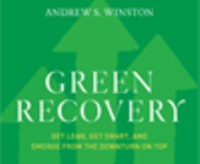The Case for Sustainable Business
 By Andrew Sauder
By Andrew Sauder (June 7, 2009) - Does greening your business require large capital investments and expenditures? According to Andrew Winston’s new book, Green Cost Cutting, the answer is an unequivocal no. In fact, companies utilizing everyday sustainable practices will see immediate improvements and will gain an advantage over competitors.
Winston is a nationally recognized expert on green business and co-author of the best-selling book Green to Gold that shows what works and what doesn’t when companies go green.
He notes the economic slump that began in 2008 has sparked concerns about how to stay innovative and how to deliver solutions to consumers, without doomsday solutions like layoffs and branch closures. In tough times actions must be taken to conserve cash and resources, and reducing energy and waste. The fundamentals of sustainability are ones that will save money.
Winston’s answer is a focus on green cost cutting measures. The book is a textbook for businesses needing to understand the relative ease of implementing green initiatives in their businesses. At its core, according to Winston, “This book presents an optimistic view of what green can do for your company.”
Filled with case studies and analysis of some of the largest corporations (such as Wal Mart, DuPont, and Coca-Cola to name a few), Winston offers realistic solutions that will help a firm to save money and to improve the bottom line.
Winston’s case is strong. Survival in these times relies on a business’s ability to, “[do] more with less.” Winston postures that sustainability and survival are not at odds, in fact, “sustainability is the very core of survival.”
So what are companies like Wal-Mart and Coca-Cola doing?
Winston illustrates small measures that offer big results like, “Filling trucks tighter, changing light-bulbs, or reducing business travel,” are some examples. Grander projects like restructuring supply changes to reduce energy costs and other energy saving strategies are exemplified in the book.
Winston is not unaware that some measures will require spending. Companies that have positioned themselves for dominance in the future, as shown by Winston, are all engaged in strategic green investment. Why?
Quoting a speech from Wal Mart Executive now CEO, Mike Duke, these times are tough, nobody is immune to the troubles of today’s economic climate. His message to shareholders and employees - “We want to accelerate our efforts in sustainability, we want to broaden our efforts.”
For those looking to see the light at the end of the tunnel, Winston shares these thoughts on how businesses can get the same kinds of advantages that large businesses are realizing. His four key strategies to save resources are as follows:
- Get Lean by revving up your energy and resource efficiency to survive the downturn.
- Get Smart by using environmental data about products and value.
- Get Creative and rejuvenate your innovation efforts by asking heretical questions such as “Can we run our business with no fossil fuels?”
- Get (your people) Engaged and excited by asking employees to solve their own, the company’s and even the world’s environmental challenges.
For more information please read a free excerpt from Andrew Winston’s Green Cost Cutting.
Source: Harvard Business ReviewYou can return to the main Market News page, or press the Back button on your browser.

